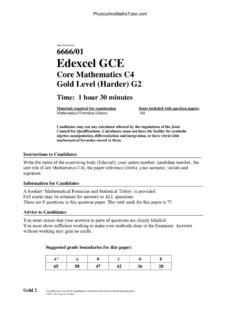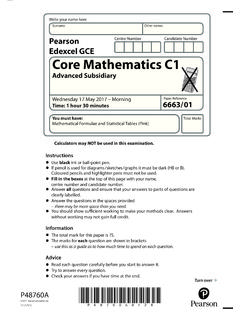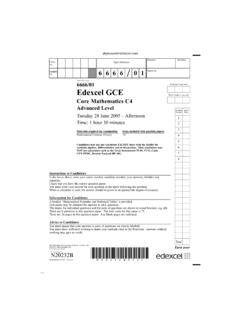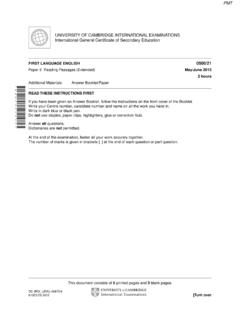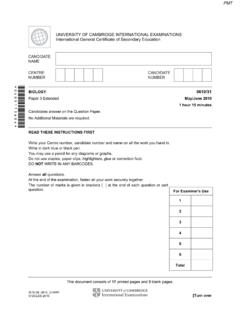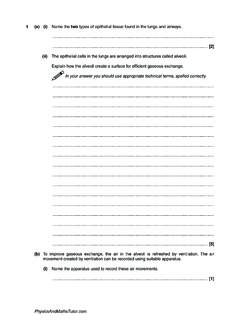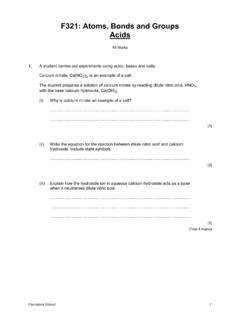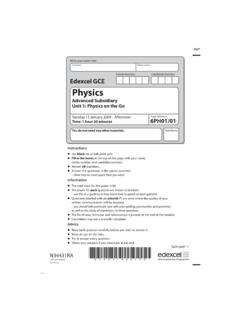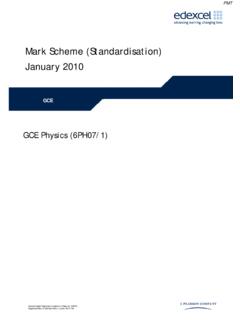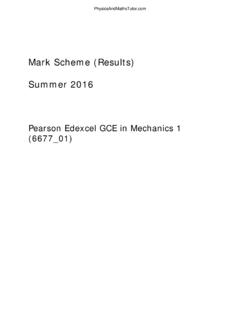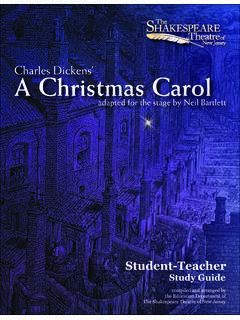Transcription of Context - A Christmas Carol - AQA English Literature GCSE
1 AQA English Literature GCSE A Christmas Carol Context work by PMT Education is licensed under CC BY-NC-ND Contents dickens 2 The Industrial 4 Poverty and Charity ..page 5 Education and Childhood ..page 7 Religion and 9 dickens Life charles dickens , who was born in Portsmouth on 7 th February 1812 and died on 8 th June 1870, is credited with being one of the greatest writers from the Victorian era. dickens wrote A Christmas Carol in 1843, 6 years into his career as a novelist. Similar to many other writers of his time he began his literary career as a journalist, then moved on to become a parliamentary journalist in 1833 . As part of his job he was required to report factual events and so some have argued that the experiences he had during this time may have made him more socially aware - giving him the inspiration he needed to include numerous areas of social commentary within his work, such as his exploration of poverty within society through A Christmas Carol .
2 The novella can also be read as a piece of Literature which is based on the experiences in dickens life as it is widely accepted that dickens was socially conscious and sympathetic towards the lower-class, ideas which are synonymous with the conclusions drawn on in the novella. Family Life dickens was born into a middle-class family and due to this he had the good fortune of being sent to school, perhaps explaining the reasons behind his value of education. However, his good fortune of being sent off to school was short lived as his father came into some financial difficulties and was put in debtors prison. It is interesting to note that his father, John dickens , was a clerk just like Bob Cratchit. Also, the Cratchit house is based on dickens own home growing up, which may perhaps explain why the narration is sympathetic towards the Cratchit family and idealises them to such an extent.
3 At twelve years old dickens was split up from his family and was sent to Warren s Blacking Factory to live and work by himself. In this time dickens endured the appalling working conditions that many of the poor faced in the Victorian times . This experience clearly gave him another view of society as he experienced poverty first hand and so went on to portray this image in many of his novels. After three years at the factory, dickens father inherited some money and so dickens was able to return to education. Maybe this experience highlighted the unjust inequalities of life between the rich and the poor, as dickens was forced to work when in financial difficulty but was able to enjoy an education after receiving money. The negative aspects of dickens childhood is mirrored through his character Scrooge. Through the Ghost of Christmas Past the reader is able to witness Scrooge s own childhood.
4 He is described to be a lonely boy who read near a feeble fire which portrays him as vulnerable to the reader and causes them to be empathetic to him. The purpose of this was to show the reader how his childhood experience shaped him. While education might have been a dark time for Scrooge it also enabled him to have a successful career, something that the working class could not get the opportunity to. Impact on the novel Journalism - dickens wrote A Christmas Carol not only because he was a victim to the troubles of poverty but also because as a journalist he had to inform people about what was going on in London. A Christmas Carol outlines dickens own beliefs on society perhaps because he felt its troubles should be handled in a way which was accessible to the public - that is, in the form of a novella. Fanny - dickens had a sister named Fanny which also happens to be the name of Scrooge s sister.
5 In the novel Fanny is a symbol of goodness. Tiny Tim - Another inspiration for a character which comes from dickens own life is the character of Tiny Tim. dickens sister Fanny had a son ( dickens nephew) who was crippled similar to Tiny Tim. In the novel Tiny Tim is used as a tool for Scrooge to discover empathy. For example, at the idea of Tiny Tim s death Scrooge felt an interest he had never felt before which is significant as this is one of the few times we see the vulnerability of Scrooge, signposting his character Education - It is clear dickens would not have been able to become a novelist if he had never been to school. dickens value of education is a clear recurring theme throughout the novel, illustrated through his linking of Ignorance and doom . Workhouse - It can be argued that the reason A Christmas Carol brings to light the dark side of the workhouses is because dickens lived very close to them and so would have been familiar with the stories of people inside.
6 This closeness would enable him to be empathetic to the plight of the working class . Though the two charity workers at the beginning of the novel explains that many would rather die than attend the workhouses, this is not hyperbole as it was the very scary truth for many. The Industrial Revolution The Industrial Revolution took place between the 18 th -19 th century and was an event which characterised the Victorian era. Here, a large percentage of the rural population migrated from the countryside to the city to work in industry ( factories) rather than agriculture. Instead of farming being the biggest mode of production in the UK machines were worked which meant faster production of goods which meant higher profits. Alongside agriculture, the industrial revolution also impacted the textile industry as textile production moved from the home to large factories and became more commercial.
7 In addition to this, the need for energy to fuel the factories created a greater need for coal mining as coal was used to power the machines used in these industrial processes. dickens wrote A Christmas Carol in what was widely acknowledged as the end of the Industrial Revolution . The mechanisation of industry meant less demand for workers as machines were able to do their jobs. While this meant that Britain was going through an economic boom, it had a detrimental impact on the working class as it meant that they were no longer needed. In some ways, unlike the start of the industrial revolution, the end of the revolution exacerbated (meaning exaggerated) the inequalities within society. This is because it became increasingly difficult for the working class to earn enough to support themselves and their families. Societal Impact The Industrial Revolution had many impacts on Victorian society such as: Overpopulation - In order for people to find work they had to move away from the countryside and into the cities as this is where the industry and jobs were concentrated.
8 This caused the formation of slums or cramped housing in order to accommodate the large influx of people. Within the novella, Scrooge dismisses the working class as simply the surplus population which is arguably a reference to the economist Thomas Malthus (read more about him in the poverty notes). The cramped housing that the industrial revolution brought about is exemplified by the Cratchit household: dickens writes that Bob Cratchit and his wife with their six children live in a four-roomed house in a distinctly matter-of-fact tone , perhaps to illustrate how this is a simple reality. Additionally, the close quarters increased the spread of disease as people had to live very close together which meant that diseases would have spread rapidly. Childhood - The Industrial Revolution also meant that many workers were needed to run the factories and the cheapest way to do so was through child labour.
9 The working age of a child started at only five years old so many children were exploited. Families needed their children to work so they could afford the cramped living conditions. As children were working this meant that most were unable to go to school. Impact on the novel There are many ways in which the Industrial Revolution can be seen to have influenced A Christmas Carol . It can be argued that the Industrial Revolution is metaphorically a character within dickens novel as it has a lot of power to dictate the lives of people, especially that of the working class. This is seen through the pitiful situation of the Cratchits who would have lost Tiny Tim if Scrooge hadn t reformed and helped their family. Within the novel dickens is highly critical of the darker consequences of the industrial revolution. He presents these attitudes in Scrooge through the way that he treats his worker Fred before his redemption, highlighting that they are unfavourable characteristics which do not benefit society.
10 The majority of Scrooge s speech is hyperbolic in nature perhaps to exaggerate Scrooge s ignorance . He says, ..every idiot who goes about with Merry Christmas on his lips, should be boiled with his own pudding, and buried with a stake of holly through his . Here he may even be directing his distaste towards the reader, making them aware of their own ignorance and causing them to question their own character. This is important as contemporary readers of dickens were likely to be rich and so may hold the same views and opinions as Scrooge. By confronting readers with ideas that they too may be ignorant, dickens ensures they will benefit and learn from the messages carried within the novella . ** Poverty and Charity Poverty Poverty is defined as the lack of basic necessities that are needed for a person to live ; for example, food, water, and clothing. At the beginning of the novel the two charity workers reference this idea, saying that many thousands are in want of common necessities.
